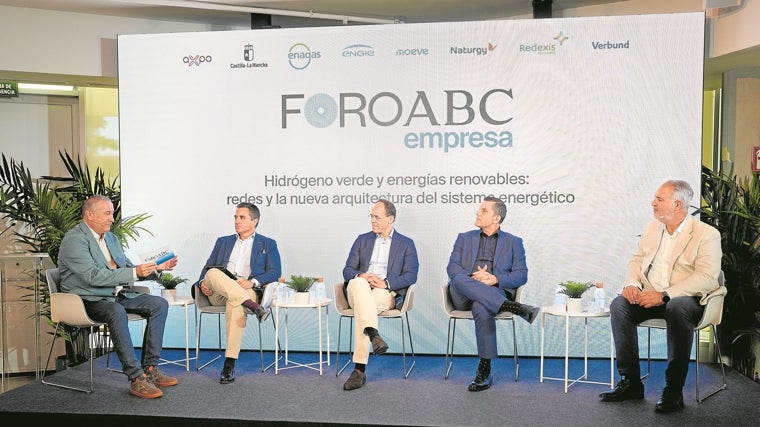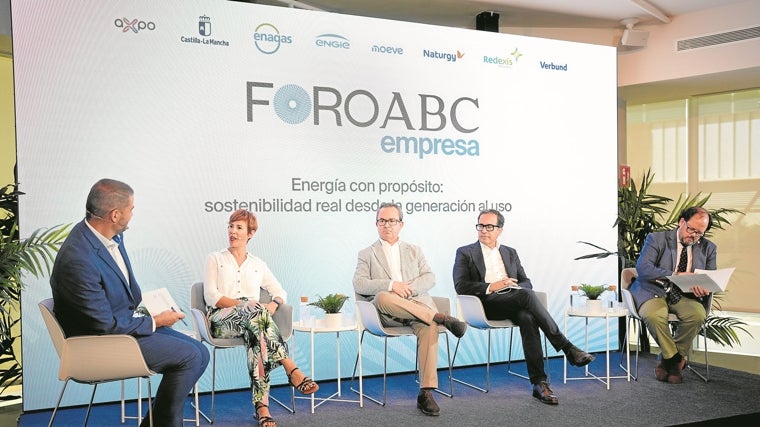The lights and shadows of the necessary renewable transformation

The latest edition of the ABC Business Forum, held last Friday at ABC's headquarters in Madrid, this time under the title "Energy with a Future – Joining Forces for a Green Energy Future," offered a comprehensive analysis of the present and future of a renewable energy transformation that, despite the massive impact of the recent blackout, has no turning back.
The event, which featured collaborations with the Regional Government of Castilla-La Mancha, the Community of Madrid, Axpo, Enagás, Engie, Moeve, Naturgy, Redexis Renovables, and Verbund Green Power Iberia, addressed the context of decarbonization, strategic autonomy, and renewable energy deployment. Spain faces the challenge of modernizing its infrastructure, scaling up energy storage, strengthening networks, and ensuring security of supply.
As Yolanda Gómez, ABC's deputy director of economics, highlighted during the presentation of the conference, for these factors to develop efficiently, "we must avoid bureaucratic bottlenecks and regulatory rigidity, since we have a lot at stake, both economically and socially."
Next, Raúl Masa, an ABC economics journalist specializing in the energy sector, interviewed María Mercedes Gómez Rodríguez, Minister of Sustainable Development for the Regional Government of Castilla-La Mancha. The latter began her presentation by highlighting the present and present state of the autonomous community's work in the field of sustainability: "To be leaders, you have to put in a lot of work, and in this regard, we have managed to go from 67 MW of installed renewable power in 2019 to 16,300 MW in 2024." These results are supported by data such as the more than €538 million in investment in 2024 (€4,900 million planned by 2050) and nearly 3,500 jobs generated by the renewable sector."
In this context, Gómez Rodríguez emphasized the importance of renewable gases (renewable hydrogen and biomethane) "to continue on the path of decarbonization and, in the case of biomethane, to dispose of organic waste and replace fossil gas in its use, for example, at the residential level. This option will allow us to create more than 1,600 jobs between now and 2050."
He emphasized the importance of his government's initiatives, such as the specific Investment Attraction and Priority Project Declaration units, which work with various business sectors. This institutional performance, in this case, provides the rest of the country with 14% of its surplus energy and anticipates achieving the 2030 renewable energy targets by 2027.
The minister stressed the importance of legal and environmental security "so that companies can operate under proper conditions, which is why public-private collaboration is so important, to guarantee these aspects while promoting sustainable development." This development, in the case of Castilla-La Mancha, is centered around "photovoltaic energy (almost 49% of production), wind power at just over 30%, and hydropower at 10%... but we must also add the potential of green hydrogen, biomethane, and energy self-consumption, both in companies, homes, and public buildings (up to 16%, with 100% coming from renewable energy). Socializing energy is one of the priority objectives of the government of Castilla-La Mancha, and that is why we support reliable projects (we have 15 in our portfolio) with full guarantees."
In the first panel discussion, "Green Hydrogen and Renewable Energy: Grids and the New Architecture of the Energy System," ABC Empresa contributor Alberto Velázquez moderated the meeting with Gabriel Aguiló, Director of Energy Management at Axpo Iberia; José Benito García, Director of Operations at Verbund Green Power Iberia; Jesús Gil, Director of Hydrogen at Enagás; and Miguel Mayrata, Director of Redexis Renovables.
A confluence of knowledge and experience began with a discussion about the recent power grid blackout, in which Aguiló emphasized how "it was a completely exceptional situation in Spain, and one in which we must avoid extreme positions. In Spain, we undoubtedly have a good renewable mix, which has been developed very thoughtfully for almost 25 years, and there are several European countries that are light years ahead of us in this regard." He added, in this context, the important role of control centers.
Regarding the importance of adapting the regulatory environment to the needs of renewable energy market players, García (who emphasized the importance of renewable energy hybridization) highlighted the importance of facilitating the process: "If you add a very long processing period to a construction period... in our case, we have to explain this to the parent company in Austria so they understand the full extent of it. Of course, it must also be said that they know that few countries have more support for renewables than Spain, and the public administration is making progress in this regard."
 Alberto Velázquez, Gabriel Aguiló (Axpo Iberia), José Benito García (Verbund Green Power Iberia), Jesús Gil (Enagás) and Miguel Mayrata (Redexis Renovables)
Alberto Velázquez, Gabriel Aguiló (Axpo Iberia), José Benito García (Verbund Green Power Iberia), Jesús Gil (Enagás) and Miguel Mayrata (Redexis Renovables)
Gil, for his part, highlighted Enagás' role in developing the Spanish renewable energy mix: "In 2023, we were designated by the government as the future operator of the hydrogen backbone infrastructure in Spain, and we act as a backup for renewables, with security of supply as a priority, with the most sustainable infrastructure design possible."
And Mayrata clarified that "rather than talking about 'decarbonization,' I would talk about 'defossilization.' Electricity accounts for only 23% of final consumption, and we must work judiciously to ensure that renewable fuels contribute to optimal performance in the remaining 77%. Without forgetting the importance of biomethane, for which Spain has incredible production potential, thanks to its agricultural and agri-food sectors."
Participants in the first panel of the day agreed on the paramount importance of AI and data management, and of innovation in general, to achieve planned objectives even ahead of schedule, as well as on the need to manage an appropriate competitive framework. Energy hybridization (or, at least, bringing complementary sources together), Spain's opportunity to lead the development of green hydrogen (Gil highlighted the more than 2,600 km of pipelines), and the importance of predictive maintenance were other highlights of this part of the meeting, dedicated to the new architecture of the energy system and sustainable development in the 21st century.
Raúl Masa then moderated the second panel, "Energy with a Purpose: Real Sustainability from Generation to Use," with Nieves Cifuentes Valero, Head of Environment and Social Responsibility at Naturgy; Julio César Nieto, Head of Regulation at ENGIE Spain; Enrique Rodríguez Perezagua, Director of External Communications and Reputation at Moeve; and Luis Miguel Torres, Director General of Transport and Mobility for the Community of Madrid.
In this case, Cifuentes Valero highlighted a fact worth considering: "In Spain, we have managed to reduce our carbon footprint by a third since 2005, thanks to the penetration of renewable energy (66% of installed generation). And GDP is rising while emissions are falling, which demonstrates that sustainable development is possible."
Naturgy's Head of Environment and Social Responsibility also highlighted how "sustainability is a real business opportunity" and how his company has an internal sustainability plan with 40 indicators that is reported to the Board of Directors.
Julio César Nieto, for his part, emphasized how "the industry, the sector in general, must seek mature, economically viable, and sustainable technological solutions. The government can collaborate in our performance, as we have at least seen when we moved from the provisions of the National Energy Efficiency Fund to the current Energy Saving Certificates, which have lightened the bureaucratic burden (and in any case, should promote the review of taxes, tolls, charges, etc. for the good of society). For our part, we aim to double our renewable energy offering in the coming years."
Rodríguez Perezagua agreed, pointing out how "the energy transition is, without a doubt, a great opportunity to increase European competitiveness, and Spain is in a very good position. In this context, we must invest in networks and interconnections that allow for greater and better support for industry." He added, "the importance of a sense of urgency for industrial projects to advance and materialize quickly, as well as the need to reduce our 68% energy dependence, 10% below the EU average (green molecules in renewable gases could allow us to reach just over 10% by 2050)."
 Raúl Masa, Nieves Cifuentes Valero (Naurgy), Julio César Nieto (Engie), Enrique Rodríguez Perezagua (Moeve) and Luis Miguel Torres (Community of Madrid)
Raúl Masa, Nieves Cifuentes Valero (Naurgy), Julio César Nieto (Engie), Enrique Rodríguez Perezagua (Moeve) and Luis Miguel Torres (Community of Madrid)
Miguel Torres, for his part, highlighted the work carried out by the Madrid regional government "to reduce pollution in recent years, in a sustainable environment in which the region accounts for 45% of Spain's 'zero-label' car registrations. In any case, we will continue to focus on simplifying life for citizens and businesses, creating spaces for collaboration, and not regulating behind the industry's back... in that case, you're definitely going to make a mistake."
The Director General of Transport for the Community of Madrid also emphasized the importance of public communication, another aspect highlighted in a roundtable discussion that addressed the resistance of localities to the installation of power plants in their municipalities, as well as the importance of self-consumption; the challenge of scaling up solutions for air, rail, sea, and heavy-duty road transport… part of a series of local and global challenges in which participants agreed to give a "remarkable" rating to the current status and future of renewable energy in Spain.
As participants agreed, effective collaboration between the public and private sectors, streamlining regulations, accelerating technological developments, and recruiting qualified technical profiles (which are currently in short supply) will contribute to improving the grade, especially given that Spain has the natural resources and industrial capabilities to lead this transformation, which must move forward with a clear, realistic roadmap focused on the competitiveness, resilience, and efficiency of the new energy system.
ABC.es





